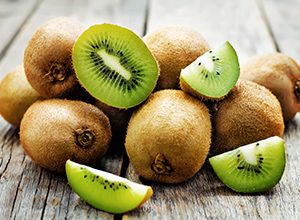
Kiwi has an interesting appearance and an interesting story. Originally grown in China and named the Chinese Gooseberry, kiwis were brought to and cultivated in New Zealand in the 1900’s.
In order to avoid high duties charged on berries, New Zealanders changed their name to kiwifruit as the small, fuzzy, brown fruit resembled New Zealand’s kiwi bird. Underneath the fuzzy brown skin of the kiwi lies a sweet green flesh with black seeds and a white center that tend to give it a tropical appearance.
With less than 45 calories per kiwi, it packs a lot of nutrition in it’s small package. Kiwi is a good source of fiber, vitamin C, vitamin K, potassium, and folate. Kiwis’ high vitamin C content helps support healthy skin and protects us from antioxidative damage. The flavonoids and carotenoids in kiwi contribute to its’ protective antioxidant capacity. The fiber and potassium content contribute to a healthy heart and lower blood pressure. Some people report a natural laxative effect from kiwi, and the fiber contributes to improved bowel regularity.
Those on beta blockers and those with limited kidney function may want to exercise caution with adding kiwi into their diet. Because beta blockers and reduced kidney function may affect potassium levels in the blood, consuming potassium from food may affect blood potassium levels. Also those with a latex allergy may wish to avoid the fruit as it has been associated with latex-fruit allergy syndrome, along with bananas and avocadoes.
Kiwi can be added to fruit salad, green salads, and smoothies, in addition to being eaten by itself. After peeling off the fuzzy brown skin, kiwis can be sliced or diced. Or, leave the skin on, cut the fruit in half, and use a spoon to scoop out the flesh and eat it right from it’s own little bowl.
Since kiwis are low in calories but high in nutrients, they make a good choice for many gastric sleeve, gastric bypass, or lap band patients. Their sweet taste make them a delight to eat, and they can be found at reasonable prices throughout most of the year. To top it off, kiwis made EWG’s 2015 “Clean 15” list, meaning they rank relatively low for pesticide residue.
The above food highlight is offered by Dr. Shillingford, M.D., P.A., a board certified general surgeon specializing in bariatric weight loss surgeries, including adjustable lap band, gastric sleeve, and gastric bypass. Dr. Shillingford and his staff enjoy providing our patients with information on foods that can be incorporated into a healthy post surgical bariatric diet. Dr. Shillingford’s gastric sleeve, gastric band, and gastric bypass patients come from all over South Florida, including Boca Raton, Fort Lauderdale, Miami, Delray Beach, Orlando, Hollywood, and the Palm Beaches.

 Am I A Candidate
Am I A Candidate  BMI Calculator
BMI Calculator  Why Choose Us
Why Choose Us